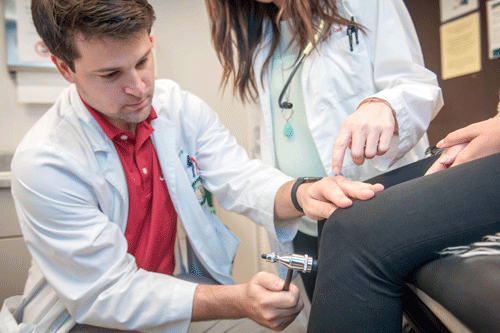 More than 80 prospective medical students interviewed by the UAB School of Medicine have also applied to a new medical education track that focuses on preparing students to become primary care physicians.
More than 80 prospective medical students interviewed by the UAB School of Medicine have also applied to a new medical education track that focuses on preparing students to become primary care physicians.
The new Primary Care Track, which is part of the SOM’s four-year medical degree program, is conducted at the College of Community Health Sciences (CCHS), which is the Tuscaloosa Regional Campus of the School of Medicine. The 2018 medical school application cycle marked the formal beginning of the Primary Care Track. Students selected for the Primary Care Track will start medical school at the School of Medicine’s main campus in Birmingham July 23, 2018.
“Students who apply and who are accepted to the track have greater interest in and will be more likely to go into primary care than those in the general applicant pool,” said Richard Streiffer, M.D., dean of CCHS and associate dean of the School of Medicine.
The Primary Care Track is designed to provide students with a strong foundation in primary care principles through longitudinal experiences with patients, mentoring relationships with primary care physicians, and special curriculum on population health and physician leadership skills. The primary care-oriented training is also an excellent experience for students who envision a community-based career in a variety of non-primary care specialties like OB/GYN or general surgery, Streiffer said.
Medical students interviewed on one of five specific days during the current interview season and came to Tuscaloosa to be introduced to CCHS the day following their Birmingham interview. The CCHS visit day focused on introducing applicants to the Tuscaloosa Regional Campus and CCHS, and explaining the Primary Care Track curriculum.
“Interest in the Primary Care Track exceeded expectations,” said Brook Hubner, director of Medical Student Affairs at CCHS. “As a result, we’ve added an additional interview and campus visit day for the upcoming medical school application cycle.”
The Primary Care Track will admit approximately 22-24 students each year, in addition to 10 to 12 Rural Medical Scholars students who round out the Tuscaloosa Regional Campus cohort. The Rural Medical Scholars Program (RMSP) is a separate primary care-oriented track now more than 20 years old, designed for students from rural Alabama communities with an interest in returning to rural practice. Prior to medical school, RMSP students spend a year in Tuscaloosa obtaining a master’s degree in rural and community health.
Students in the Primary Care Track and the RMSP will spend their first two years of medical school completing the prerequisite basic science curriculum in Birmingham, and their third year in a model of clinical education called a longitudinal integrated clerkship, or LIC, based in Tuscaloosa or other communities around the state. They will work alongside faculty for a majority of the year to follow and care for patients longitudinally, learning simultaneously across the core disciplines of medicine and in all settings—including outpatient clinics, hospitals, nursing homes and patients’ home.
This is a departure from the traditional model, which is based off a series of discipline-specific and hospital-dominant four- to eight-week clerkships in which students typically experience few encounters with the same patient and only see single episodes of illness.
The goal of the Primary Care Track and RMSP is to continue addressing the need for more primary care physicians in Alabama and the region. In 2012 in Alabama, the state had 3,512 active primary care physicians for a ratio of approximately 73 per 100,000 people, ranking it 45th in the nation, according to the Association of American Medical Colleges. The provider shortage is even worse in rural areas: 55 of Alabama’s 67 counties are considered rural, and eight counties have no hospital at all.